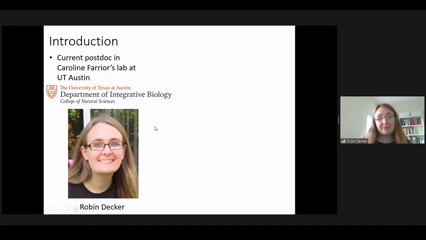MBI Videos
Robin Decker
-
 Robin DeckerClimate-driven habitat shifts pose challenges for dispersal-limited, slow-growing, late-maturing taxa. Older trees are often the most reproductive individuals in the population, but as habitats shift, these individuals are left behind in the trailing range edge, generating “zombie forests� that may persist long after the habitat has shifted. Are these zombie forests vestiges of ecosystems past or do they play an ecological role? I develop a spatially explicit, stage-structured model of tree populations occupying a shifting habitat patch to understand how zombie forests affect tree population persistence in the face of climate change. I show that zombie forests, which experience no recruitment at the trailing patch edge, help the entire population survive high rates of climate change by dispersing seeds to the core population. Over many generations, most of the core population descends from the zombie forest. These results suggest that preserving zombie forests may increase forest persistence in the face of rapid climate change.
Robin DeckerClimate-driven habitat shifts pose challenges for dispersal-limited, slow-growing, late-maturing taxa. Older trees are often the most reproductive individuals in the population, but as habitats shift, these individuals are left behind in the trailing range edge, generating “zombie forests� that may persist long after the habitat has shifted. Are these zombie forests vestiges of ecosystems past or do they play an ecological role? I develop a spatially explicit, stage-structured model of tree populations occupying a shifting habitat patch to understand how zombie forests affect tree population persistence in the face of climate change. I show that zombie forests, which experience no recruitment at the trailing patch edge, help the entire population survive high rates of climate change by dispersing seeds to the core population. Over many generations, most of the core population descends from the zombie forest. These results suggest that preserving zombie forests may increase forest persistence in the face of rapid climate change.
